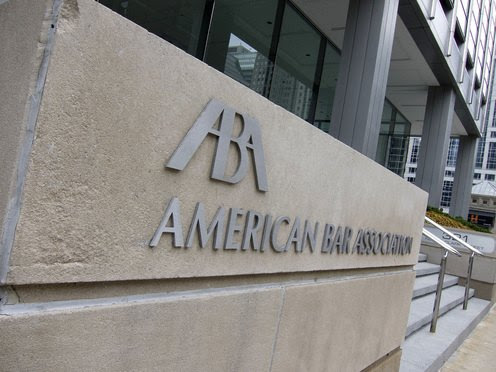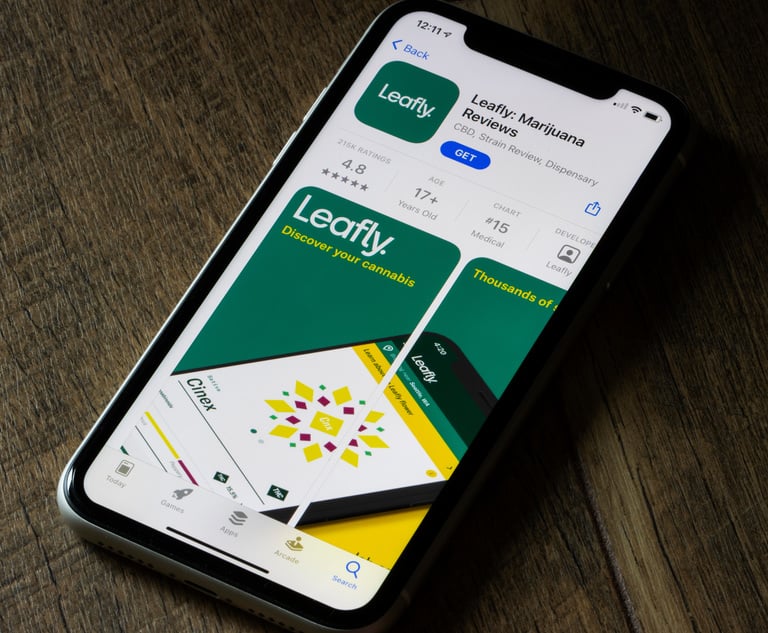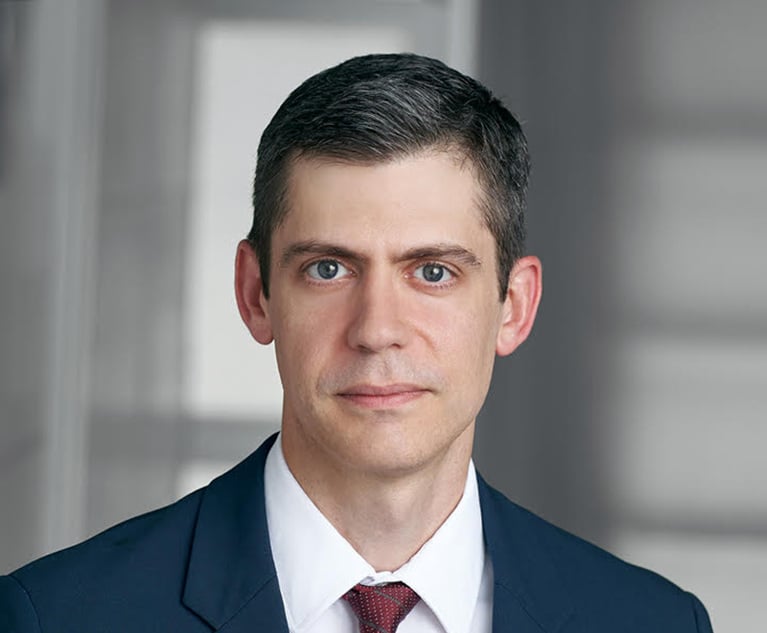Higher Law: A Resolution to Protect Cannabis Lawyers | Fox Rothschild Boosts Cannabis Practice | Workplace Medical Marijuana Protections Proposed in California | Marijuana and Data Security
Welcome to Higher Law! Our dispatch this week looks at an ABA resolution to protect lawyers in the cannabis space • Fox Rothschild's new partner in the cannabis law practice • A California bill to protect medical marijuana users in the workplace
February 20, 2020 at 04:00 PM
9 minute read
Welcome back to Higher Law, our weekly briefing on all things cannabis. I'm Cheryl Miller, reporting for Law.com from Sacramento.
This week we're looking at: An ABA resolution to protect lawyers in the cannabis space • Fox Rothschild's new partner in the cannabis law practice • A California bill to protect medical marijuana users in the workplace
Have a story idea? Tips? Feedback? You can send them to me at [email protected]. Or call me at 916.448.2935. Follow me on Twitter @CapitalAccounts.

Resolving to Protect Cannabis Lawyers: Q&A With Day Pitney's Steven Cash
The American Bar Association this week approved a resolution calling on Congress to ensure that lawyers can provide counsel to state-complaint clients in the marijuana space without fear of federal prosecution. On Wednesday I spoke with the resolution's co-author, Day Pitney counsel Steven Cash, about how this resolution came to be.
Here are some excerpts from our chat, edited for length and clarity.
Higher Law: What's your background on this issue?
Steven Cash: I'm in a white-collar national security group at Day Pitney. Two years ago or so we had a major client come to us and say, "We're writing these contracts that involve cannabis, is that OK?" And that got us really thinking about this issue because not long after that we started having more and more clients come to us with cannabis related issues.
So we started thinking about what our policy was going to be. And we took a pretty conservative approach. There are business risks associated with this. We had to figure out whether our clients would be upset with us if we ended up with a cannabis-related practice? Is there revenue? Is it too risky?
The second issue was, could we get in trouble? Does it expose the firm to risks, other than reputational risks?
We viewed it under the Cole Memorandum and the Rohrabacher amendment as very unlikely there would be a prosecution. But that got us to the legal, professional and a truly deep ethical question, which is, so what if you're not going to be prosecuted? How do we feel about knowingly violating a federal law, even if we don't think we're going to get in trouble for it?
We kept coming back to, should lawyers do this? So that's how we thought about it at the firm.
How did the ABA resolution come about? I was asked to speak in September at the ABA TIPS cannabis committee event in Chicago. And I'm sitting on a panel, and everyone in the room, in one shape or form, is what I'd call a true cannabis lawyer.
And I basically say, "I sat through the last three panels and I'm looking out over a room of really smart lawyers who've been telling me about all of the wonderful things that I'm doing to help their clients set up and run cannabis businesses, and I'm a former prosecutor and it sounds like I just heard two-and-a-half hours of confessions, which I notice are being videotaped."
"Will a prosecutor decide to do something about that? I don't know. I don't think so. But I think we should all sort of search our souls. Is this OK? Is this OK for the profession?"
That got ABA people talking, and we talked about it in the context of cannabis. So we put together a resolution and we put together a report in support of that resolution and it got put on the agenda for last week.
Are you an outlier in this in some ways? A lot of lawyers are aware of the state-federal conflict but they're OK knowing their state bar has professional guidelines giving lawyers the blessing to serve clients in this space.
I think some lawyers hadn't thought all the way through. In addition to not really remembering Con Law, most of the lawyers in this space are not criminal lawyers. They also haven't thought about aiding and abetting a conspiracy since first-year law school. So it's novel for them to think about it that way.
Any chance that anyone in Congress takes this up quickly?
I think there is. Even those members who have been opposed to marijuana legalization may be amenable to the idea that we can at least have lawyers making sure that people comply with state regulations.
It's not only a rule of law or a policy issue here. It's a practical issue. All these states' regulatory schemes are fairly complicated, schemes which are designed to be run by lawyers. If you put out a couple hundred pages of regulations written in regulation legal style, you're sort of counting on there being lawyers to help people comply with them.
Even members of Congress who do not want the federal government to legalize, I think if you're not going to take steps to shut down all the states, you'd say I'd at least like it to be done according to the rules that the states are setting up. And that's not going to happen without a really engaged bar.

Who Got the Work
• Fox Rothschild said the firm has hired Joshua Ashby in Seattle as a partner in the cannabis law practice and corporate department. "Josh understands the nuanced challenges that new and emerging businesses face in the cannabis sector," said Joe Shickich, Fox's Seattle office managing partner. Ashby formerly was co-chair of the cannabis law group at Lane Powell PC.
• Former Supreme Court of Nevada Chief Justice Michael Douglas was named chair of the Nevada cannabis compliance board, the governor's office said. Gov. Steve Sisolak also appointed Dennis Neilander, of counsel at Kaempfer Crowell, to the board. Neilander earlier served as chair of the Nevada State Gaming Control Board for 10 years,
• Brooks Kushman attorneys Rebecca Cantor and Mark Cantor have filed a trademark lawsuit in the U.S. District Court for Eastern Michigan on behalf of FKA Distributing Co. The complaint targets Ella Essentials CBD and Urban Roots CBD. Counsel have not yet appeared for the defendants.
• Cronos USA Client Services, a subsidiary of Cronos Group, has registered to lobby the federal government on "all matters affecting the cannabis industry," according to recent disclosure filings. The sole lobbyist listed is Pete Meachum, former chief of staff to ex-Wisconsin congressman Sean Duffy. Meachum joined Cronos late last year as senior director of government affairs.

In the Weeds…
>> Cannabis industry isn't immune from hacks and fraud. "Security experts have long warned that the cannabis industry is susceptible to both cybercriminal and fraudulent activities. It's not exactly the Wild West anymore: Businesses and state-legal markets have matured. But risks and concerns about criminal activity and fraud haven't waned." [CNN]
>> A California bill would shield medical marijuana users at work."To be discriminated against by your employer because of the type of medicine you use is both inhumane and wrong," said the bill's author, Assemblyman Rob Bonta. Safety-sensitive workers and federal contractor jobs would not be covered by the bill's protections. [Los Angeles Times]
>> Connecticut's pot proposal is in print. Gov. Ned Lamont has released his plans to legalize recreational marijuana in a 108-page bill. There are rules on labeling, a per-gram tax structure, an equity commission and personal possession limits. Sales could start in July 2022. [Hartford Courant]
>> Washington state could give new licenses to equity applicants. House Bill 2870 would put residents disproportionately impacted by the war on drugs at the head of a line for cannabis licenses that have been forfeited, revoked or canceled. The legislation would also create a grant program to help applicants with the licensing process and business plans. [The Seattle Times]
>> Who got the medical marijuana licenses in Missouri? The St. Louis Post-Dispatch has the rundown, including some past legal troubles for a few of the successful applicants. About 130 business groups secured all the available business licenses as well as 10 testing licenses and 21 licenses for transporting marijuana. [St. Louis Post-Dispatch]
>> A dispensary pharmacist says she was fired for not sampling the goods. Pennsylvania resident Carol Kopiak sued her former employer Justice Grown, alleging she was improperly dismissed in 2018 for declining to use the facility's marijuana. The dispensary's owners called the allegation "a lie" and said none of the company's pharmacists used marijuana. [Times Leader]

Your Calendar: All the Things
Feb. 24 - Strafford presents the CLE webinar "Subject Matter Description and Contract Invalidation, Choice-of-Law and Marijuana-Friendly Courts, Arbitration Provisions." Leading the webinar will be Katy Young, managing partner of Ad Astra Law Group, and Gard Law Firm founder Jeffrey Gard.
Feb. 24-25 - Benzinga Cannabis Capital Conference takes place in Miami, Florida. Scheduled speakers include Holly Bell, director of cannabis at Florida's Department of Agriculture and Consumer Affairs; Hoban Law Group partner Donnie Emmi; and Gerry Greenspoon, co-managing director of Greenspoon Marder.
Feb. 27 - The Seminar Group hosts the event "Business Issues in Cannabis & Industrial Hemp" in Oakland, California. Faculty include Clark Howell partner Nicole Howell; Brownstein Hyatt Farber Schreck partner Amy Steinfeld; and Fox Rothschild partner Erin Letey.
Feb. 27 - The International Cannabis Bar Association hosts the webinar "The Role of Blockchain in Cannabis: From Fintech to Track & Trace." Presenters for this webinar include Najarian Peters, assistant professor in the Institute for Privacy Protection.at Seton Hall University and Jennifer Oliva, associate professor at Seton Hall Law.
This content has been archived. It is available through our partners, LexisNexis® and Bloomberg Law.
To view this content, please continue to their sites.
Not a Lexis Subscriber?
Subscribe Now
Not a Bloomberg Law Subscriber?
Subscribe Now
NOT FOR REPRINT
© 2025 ALM Global, LLC, All Rights Reserved. Request academic re-use from www.copyright.com. All other uses, submit a request to [email protected]. For more information visit Asset & Logo Licensing.
You Might Like
View All
NY Cannabis Marketing Rulings / Rescheduling Effects / Honigman's Work on Trademark Suit / Goodbye
9 minute read
Workplace Weed and Labor Pacts / State AGs and Hemp / Maryland Licensing Suit / Vicente Sues Recruiter
9 minute readLaw Firms Mentioned
Trending Stories
- 1Products Liability: The Absence of Other Similar Claims—a Defense or a Misleading Effort to Sway a Jury?
- 2529 Accounts Are Not Your Divorce Piggybank
- 3Meta Hires Litigation Strategy Chief, Tapping King & Spalding Partner Who Was Senior DOJ Official in First Trump Term
- 4Courts Beginning to Set Standards for Evidence Relying upon Artificial Intelligence
- 5First-Degree Murder Charge May Not Fit Mangione Case
Who Got The Work
Michael G. Bongiorno, Andrew Scott Dulberg and Elizabeth E. Driscoll from Wilmer Cutler Pickering Hale and Dorr have stepped in to represent Symbotic Inc., an A.I.-enabled technology platform that focuses on increasing supply chain efficiency, and other defendants in a pending shareholder derivative lawsuit. The case, filed Oct. 2 in Massachusetts District Court by the Brown Law Firm on behalf of Stephen Austen, accuses certain officers and directors of misleading investors in regard to Symbotic's potential for margin growth by failing to disclose that the company was not equipped to timely deploy its systems or manage expenses through project delays. The case, assigned to U.S. District Judge Nathaniel M. Gorton, is 1:24-cv-12522, Austen v. Cohen et al.
Who Got The Work
Edmund Polubinski and Marie Killmond of Davis Polk & Wardwell have entered appearances for data platform software development company MongoDB and other defendants in a pending shareholder derivative lawsuit. The action, filed Oct. 7 in New York Southern District Court by the Brown Law Firm, accuses the company's directors and/or officers of falsely expressing confidence in the company’s restructuring of its sales incentive plan and downplaying the severity of decreases in its upfront commitments. The case is 1:24-cv-07594, Roy v. Ittycheria et al.
Who Got The Work
Amy O. Bruchs and Kurt F. Ellison of Michael Best & Friedrich have entered appearances for Epic Systems Corp. in a pending employment discrimination lawsuit. The suit was filed Sept. 7 in Wisconsin Western District Court by Levine Eisberner LLC and Siri & Glimstad on behalf of a project manager who claims that he was wrongfully terminated after applying for a religious exemption to the defendant's COVID-19 vaccine mandate. The case, assigned to U.S. Magistrate Judge Anita Marie Boor, is 3:24-cv-00630, Secker, Nathan v. Epic Systems Corporation.
Who Got The Work
David X. Sullivan, Thomas J. Finn and Gregory A. Hall from McCarter & English have entered appearances for Sunrun Installation Services in a pending civil rights lawsuit. The complaint was filed Sept. 4 in Connecticut District Court by attorney Robert M. Berke on behalf of former employee George Edward Steins, who was arrested and charged with employing an unregistered home improvement salesperson. The complaint alleges that had Sunrun informed the Connecticut Department of Consumer Protection that the plaintiff's employment had ended in 2017 and that he no longer held Sunrun's home improvement contractor license, he would not have been hit with charges, which were dismissed in May 2024. The case, assigned to U.S. District Judge Jeffrey A. Meyer, is 3:24-cv-01423, Steins v. Sunrun, Inc. et al.
Who Got The Work
Greenberg Traurig shareholder Joshua L. Raskin has entered an appearance for boohoo.com UK Ltd. in a pending patent infringement lawsuit. The suit, filed Sept. 3 in Texas Eastern District Court by Rozier Hardt McDonough on behalf of Alto Dynamics, asserts five patents related to an online shopping platform. The case, assigned to U.S. District Judge Rodney Gilstrap, is 2:24-cv-00719, Alto Dynamics, LLC v. boohoo.com UK Limited.
Featured Firms
Law Offices of Gary Martin Hays & Associates, P.C.
(470) 294-1674
Law Offices of Mark E. Salomone
(857) 444-6468
Smith & Hassler
(713) 739-1250










